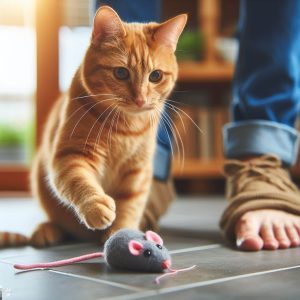Has your cat lost its normal meow and can now only manage faint squeaking sounds? A cat that can’t meow properly or has lost its voice altogether likely has an underlying medical issue affecting its vocal cords or throat. While kittens may squeak at first before developing an adult meow, a sudden inability to meow in grown cats is abnormal and requires veterinary attention.
In this comprehensive guide, we’ll cover the common reasons for squeaking instead of meowing in cats. You’ll learn how to identify the cause, get proper treatment, and help your feline regain its normal vocalizations. With the right care and patience, most cats can bounce back from vocal issues. Let’s dig in to understand what’s going on when cats can’t meow and just squeak.
Why Can’t My Cat Meow Normally?
Cats use meowing and other vocalizations to communicate their needs and feelings to us. It’s their primary language. When your cat stops meowing and resorts to odd squeaking noises alone, it likely indicates:
- Pain or discomfort in the throat or mouth – Any condition causing throat inflammation, irritation, or swelling can make meowing painful or difficult. The same goes for problems affecting the mouth, teeth, or jaws.
- Impaired vocal cord function – Damage or paralysis of the vocal folds prevents them from vibrating normally to produce a full meow. This causes weak, raspy squeaking instead.
- Blockage of the upper airway – Obstructions from foreign objects, mucus, tissue swelling, or tumors can interfere with airflow over the vocal cords and affect meow sounds.
Let’s explore the most common medical causes of meow impairment in more detail.
Common Medical Causes of Squeaking Instead of Meowing
Many conditions can hamper a cat’s ability to meow normally and cause odd squeaking noises instead. Here are the top reasons:
Upper Respiratory Infections
Infections of the nose, throat, and upper airways like feline herpesvirus, calicivirus, or bordetella are a frequent cause of voice change in cats.
The swollen inflamed tissues put pressure on the larynx. Thick mucus secretions further obstruct airflow and vibrations over the vocal folds.
Upper respiratory infections also cause painful sore throats, leading cats to alter their meow to avoid aggravating the discomfort. Muffled, raspy squeaks are less painful for them to vocalize.
Laryngitis
Laryngitis refers to inflammation of the larynx or voice box. It can arise from:
- Viral or bacterial infections
- Irritants like smoke or dust
- Allergic reactions
- Excessive vocalization
With laryngitis, the swollen vocal cords cannot vibrate properly to produce normal meow sounds. The raspy, muted squeaking noises reflect the impaired vibration.
Foreign Objects
Cats are curious creatures and may accidentally swallow or inhale foreign objects like:
- Blades of grass
- Needles
- Pins
- Rubber bands
Objects lodged in the throat or trapped against the vocal folds interfere with vocal cord movement and airflow. This results in strained, odd squeaking.
Birth Defects
Kittens born with abnormalities of the larynx, vocal cords, or voice box may never develop a normal adult meow.
Instead, they are left with a permanent squeaky, raspy cry. Common congenital defects include small or malformed larynxes and cleft palates.
Neoplasia
Tumors arising on or near the larynx can affect vocal function. They may press on or restrict the vocal cords directly. They can also impinge on nerves that control the larynx.
Cats with laryngeal/throat tumors often have a chronically hoarse, cracking squeak instead of a normal meow.
Nerve Damage
Injuries, strokes, or diseases affecting the nerves that control the vocal cords can lead to partial paralysis. With reduced nerve input, the vocal folds lose muscle tone and cannot vibrate properly.
A permanent strained, squeaking cry often results. The nerves commonly involved include the recurrent laryngeal nerves and the vagus nerves.
Why Do Kittens Squeak Instead of Meowing?
Unlike adult cats that suddenly lose their meow, kittens normally go through a squeaking phase early in life. The reasons include:
- Physical immaturity – Kittens are born with tiny vocal cords that need to grow and strengthen. Their voice boxes are still developing the necessary cartilage, muscle, and mucosa.
- Learning vocal skills – Meowing involves coordinated nerve signals and precise muscle movements. It takes practice for kittens to master this complex behavior.
- Signaling the mother – High-pitched sounds are easier for very young kittens. Squeaks and distress cries stimulate the mother’s caregiving instincts.
With normal growth and development, kittens begin interspersing squeaks with raspy mews around 2-4 weeks of age. By 8 weeks, most can meow fairly normally. Some cats retain kittenish voices throughout adulthood though.
Why Can’t My Cat Meow – Diagnostic Tests
If your cat normally had an adult meow but can now only manage strained squeaking, make an appointment with your veterinarian right away. Be prepared to describe when you first noticed the voice change and any other accompanying symptoms.
To pinpoint the exact cause of the vocal impairment, the vet will perform some or all of the following diagnostic steps:
- Physical exam – Your vet will thoroughly examine your cat’s head, neck, and throat. They’ll palpate for pain, masses, or swelling. Checking your cat’s mouth also helps rule out dental disease.
- Bloodwork – Routine blood tests help assess your cat’s overall health status. They can reveal the presence of inflammation, infection, or illness affecting the whole body.
- X-rays or ultrasound – Imaging studies of the neck allow evaluation of the larynx, vocal cords, and related structures. They help identify laryngeal defects, foreign objects, masses, or obstructions.
- Rhinoscopy – A small flexible endoscope inserted into the nasal passages examines for upper respiratory infections or foreign bodies.
- Laryngoscopy – Sedated insertion of a scope into the voice box lets the vet directly visualize the vocal cords and larynx. Any abnormalities are identified.
- Biopsies – Small tissue samples of any masses or lesions may be taken for analysis in the lab to rule out cancer.
Based on the diagnostic findings, your vet will determine the specific cause of the vocal impairment and advise on appropriate treatment.
How to Treat a Cat That Can’t Meow and Just Squeaks
Getting a cat that has lost its normal meow back to vocalizing properly again involves:
- Treating the underlying cause – Whether infection, trauma, or congenital defect, the source of the issue must be resolved for the voice to recover.
- Managing pain and inflammation – Medications that reduce laryngeal swelling, irritation, and discomfort enable healing.
- Protecting the throat – Preventing further injury or irritation allows tissues to rest and recuperate.
- Providing supportive care – Meeting nutritional needs and keeping the throat lubricated prevents secondary issues.
- Allowing time – Have patience. It takes time for inflammation to resolve, nerves to mend, and skills to improve.
Let’s go over specific medical treatment approaches based on the common causes of feline vocal impairment:
Respiratory Infections
- Antibiotics – Bacterial upper respiratory infections are treated with antibiotic therapy. Viral infections won’t respond to antibiotics, so supportive care is provided instead.
- Corticosteroids – Steroids like prednisolone reduce airway inflammation and swelling to improve breathing and comfort.
- Nebulization – Breathing moist medicated vapors helps thin secretions and soothes irritated throat tissues.
- Immune support – Lysine supplements discourage viral replication and promote healing.
- Rest – Confine your cat to a single room without other pets to prevent overexertion. Reduce stress.
Laryngitis
- Corticosteroids – Steroids decrease laryngeal inflammation and return the voice to normal as swelling resolves.
- Humidification – Using a humidifier adds needed moisture to the air, preventing dryness that aggravates laryngeal irritation.
- Throat lozenges – Oral gel or paste treatments coat and lubricate the throat for relief from roughness and pain.
- Voice rest – Prevent your cat from excessive vocalization by keeping activity and stress levels low.
- Remove irritants – Eliminate inhaled irritants like smoke and strong scents that can worsen laryngitis.
Foreign Bodies
- Anesthesia – Sedation or general anesthesia allows safe extraction of objects lodged in the throat or airways.
- Endoscopy – Tools attached to a scope can help retrieve foreign objects and retrieve them without invasive surgery.
- Emergency surgery – Rarely, deep obstructions may require surgical removal if they can’t be retrieved otherwise.
Birth Defects
- Surgery – Structural laryngeal defects present at birth may require reconstructive surgery later in life if they compromise breathing.
- Long term management – Kittens with permanent developmental anomalies can live happily; they just don’t develop a normal meow.
Neoplasia
- Biopsy – Confirm cancer with tissue samples examined by a lab for a definitive diagnosis. This guides treatment.
- Surgery – Benign masses are removed to preserve laryngeal function. Cancer may require partial laryngectomy.
- Chemotherapy – Some laryngeal tumors respond well to anti-cancer medications.
- Radiation – Types that don’t respond to chemotherapy may shrink with targeted radiation treatments.
Nerve Damage
- Medications – Steroids reduce inflammation pressing on nerves. Nerve medications may help damaged nerves partially recover.
- Surgery – Severed nerve repairs have a good success rate for restoring vocal function.
- Time – Nerves have some natural regenerative capacity. Recovery of minor injuries is possible over 4-6 weeks.
Have realistic expectations for recovery based on your cat’s specific diagnosis. Some causes of feline vocal impairment are reversible while others may permanently alter the voice. But with therapy tailored to the underlying problem, the majority of cats can regain a functional meow that communicates their needs.
How to Help a Cat With Voice Changes Recover
Support your cat’s return to normal vocal function by:
Avoiding Collars
Ditch the collar temporarily to prevent any pulling or compression on your cat’s throat as it heals. Use a comfortable harness for walks instead. Elizabethan collars are fine to protect incisions.
Offering Soft Foods
Feed moist canned or homemade foods that are easy to swallow. Avoid dry kibble that could irritate an already sore throat.
Using a Humidifier
The moisture put into the air by a cool mist humidifier soothes respiratory tissues and eases laryngeal irritation. Place several around your home.
Giving Prescribed Medications
Follow your vet’s medication instructions exactly. Complete the full course even if your cat seems to recover quickly.
Monitoring for Problems
Watch for signs of throat pain like drooling or difficulty swallowing. Contact your vet if symptoms persist or worsen despite treatment.
Avoiding Smoke and Irritants
Prevent future laryngeal irritation by eliminating exposure to inhaled irritants that could trigger recurrence.
Letting Your Cat Rest
Encourage voice rest by keeping activity and stress low. Coax any crying kittens to use softer mews.
Being Patient
It takes at least several weeks for swelling to fully resolve, nerves to mend, or skills to improve after illness or injury. Allow your cat ample recovery time.
With attentive nursing care and immunotherapy guided by your veterinarian, most cats with vocal impairment can regain normal meowing and other vocalizations. While it may take patience depending on the cause, supporting your cat through this frustrating phase is worthwhile when you once again hear that beloved feline meow!
Frequently Asked Questions
Should I worry if my older cat can’t meow and just squeaks?
Yes, any sudden loss of a previously normal meow in an adult cat warrants veterinary examination. Significant voice changes signal an underlying problem needing prompt diagnosis.
How long might it take for my cat to get its meow back?
With appropriate treatment, improvement can begin within days but complete restoration may take weeks. Respiratory infections may resolve within 2 weeks. Laryngitis can last 4+ weeks. Nerve damage may take 6+ weeks to show recovery.
Can a cat purr if it can’t meow?
Yes, a cat can often still purr even if losing its meow. Purring relies on different muscles and nerves than meowing/vocalizing. Certain severe laryngeal and nerve injuries affect all vocal sounds.
Should I limit my squeaking kitten’s meowing?
You need not limit normal squeaky mewing in healthy kittens. It is how they learn vocal skills. But do discourage excessive crying that strains their immature voice box. Distract them with play instead.
Could my cat have permanently lost its normal meow?
In cases of birth defects, extensive nerve damage, or tumor removal, meowing ability may be permanently altered. But most cats regain a functional voice. Focus on managing any chronic changes.
The Takeaway
- Changes from a normal meow to weak squeaking indicate your cat is having difficulty vocalizing properly.
- Upper respiratory infections, laryngitis, obstructions, and nerve damage are common medical causes.
- Kittens naturally squeak at first before developing an adult meow over 2-4 months.
- Diagnostic tests like laryngoscopy help identify the exact cause in affected cats.
- Treatments range from antibiotics for infections to surgery for congenital defects. Medications, humidification, voice rest, and time also aid recovery.
- With proper veterinary treatment tailored to the underlying problem, most cats can regain adequate meowing and vocal ability, though it may take patience.
If your formerly vocal feline is now limited to plaintive squeaks, don’t delay in consulting your veterinarian. Prompt diagnosis and appropriate therapy can help restore a happy healthy meow that lets your cat once again speak its mind!



